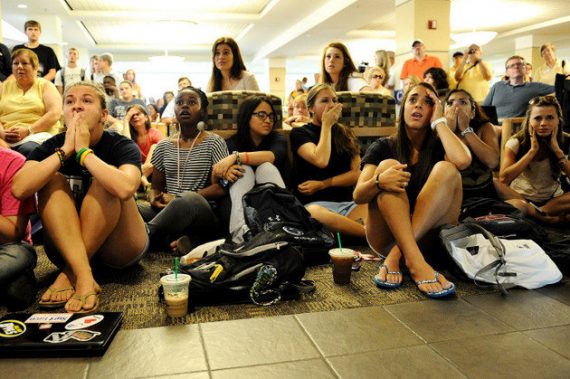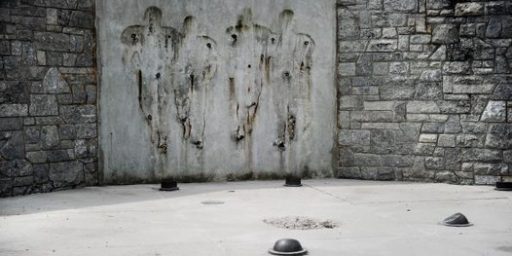Penn State Plea Bargained to Avoid Death Penalty
Penn State was facing a four year suspension of its football program but worked out a less harsh punishment.
Penn State was facing a four year suspension of its football program but worked out a less harsh punishment.
Yahoo Sports (“Penn State faced four years with no football had it not agreed to current sanctions“):
In an interview with Yahoo! Sports’ Pat Forde on Monday, NCAA President Mark Emmert revealed that members of the Division I Board of Directors discussed much more severe penalties than the ones actually levied against Penn State.
Now we know specifically what was on the table.
Emmert and Penn State President Rodney Erickson told ESPN’s “Outside the Lines” on Wednesdaythat the majority of school presidents favored suspending the university’s football program for four years.
Instead of either accepting that unprecedented punishment or forcing the NCAA to launch a formal investigation by refusing to accept sanctions, Erickson entered covert discussions with the NCAA in hopes of reaching a compromise that did not include the death penalty. The result was a defacto plea bargain in the form of the consent agreement Penn State leaders signed. In return for the NCAA taking the “death penalty” out of the punishment, Erickson agreed not to appeal penalties that included a four-year bowl ban, the nullification of 112 wins, massive scholarship reductions and a $60 million fine.
That Erickson negotiated that deal without consulting Penn State’s board of trustees did not please everyone. The board of trustees met Wednesday with Erickson to discuss whether he had the authority to agree to the penalties without its approval and released a statement begrudgingly expressing its acceptance of the deal he negotiated.
“The Board finds the punitive sanctions difficult and the process with the NCAA unfortunate,” the statement read. “But as we understand it, the alternatives were worse as confirmed by NCAA President Mark Emmert’s recent statement that Penn State was likely facing a multi-year death sentence.”
This explains why Penn State accepted such severe punishment without complaint or appeal despite the NCAA overstepping its authority and skipping due process.





I don’t believe the NCAA is required to follow “due process.” As a long time follower of college sports the NCAA sets its own rules and policies and utilizes them when and as it sees fit.
@Dean: While there may be no legal or even contractual requirement for due process, at the very least due process would be a mechanism to avoid or win a lawsuit. Consent, as employed here, would be another avenue.
That notwithstanding, I’m pretty disappointed that the death penalty didn’t stand. I’m glad to hear they were considering four years of suspension for the football program, but I expected a couple of years, which would have been just, IMHO.
I thought Penn St got off light (not that they are light penalties, but lighter than they deserve), and this report just tends to confirm my original opinion.
The surrounding communities would have been economically devastated if the 4 year death penalty had been implemented.
@Nikki: I understand that, Nikki. At the same time, they were a part of enabling Paterno and Penn State to disregard morality, ethics and common decency to promote and protect their beloved football program. I’m not so sure I’d have a problem with them paying that price.
@Boyd: @Boyd: I still do not see how punishing a lot of innocent people will help. The courts have taken care of one of the guilty and others will follow, and one is dead. Of all of the universities, Penn State had an excellent record over the years compared to many of the others. All colleges and universities need to put measures in place that will attempt to prevent what took place there and other problems that occur. There are a lot of rules in place, but they always get broken. I thought that one good thing that could come out of this is for PSU to create a lot of programs that can involve and help children: athletic and arts camps, science activities, and many other things. In this way, PSU can give to and help the community. Children would love the chance to be coached in a camp by some of the football and basketball players. There needs to be positive actions, not just a bunch of punishments.
@Racehorse: And one of those positive actions will be the $60,000,000 they’ll be contributing to programs to prevent this kind of abuse.
And while the people who even tangentially live off Penn State football may not be guilty, they aren’t innocent, either.
@Boyd: Slight correction: $73 million including the $13 million from the Big 10 Conference.
@Boyd:
So are you personally responsible for the crimes of anyone you’re even tagentally associated with?